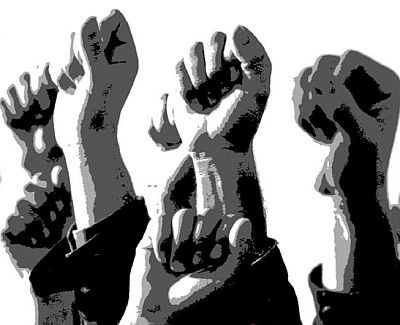 Teachers across universities are questioning the “thoughtlessness, rushed manner and opacity” of the process in which the UGC announced the introduction of the choice-based credit system across universities in the country.
Teachers across universities are questioning the “thoughtlessness, rushed manner and opacity” of the process in which the UGC announced the introduction of the choice-based credit system across universities in the country.
The directive, they fear, could adversely impact the autonomy of universities and threaten the basic constitutional rights of diversity and freedom of expression in the country.
Rediff.com contributor Upasna Pandey reports.
Teachers across universities are set to lock horns with the government as they express “anxiety and alarm” over the proposed changes in the higher education system by the Human Resources Development ministry and the University Grants Commission, beginning with introduction of choice-based credit system across 51 central universities.
“There is complete chaos and confusion among teachers and students across universities over the CBCS, initiated through a directive last month, which needs to be implemented in 2015-16 session itself. It has been initiated without any consultation with students or teachers. This is only first of the many proposed changes by the MHRD,” says Professor Apporvanand Jha of DelhiUniversity’s Hindi department.
All central universities in Delhi like the DelhiUniversity, Jamia Milia Islamia, JawaharlalNehruUniversity and BR Ambedkar University, are part of the Academics for Reform.
The Academics for Reform released a collective discussion document, in response to government’s proposals in Delhi on Thursday.
“A common syllabus across all central universities is not only a mammoth task, but also largely unnecessary. There is diversity among universities that will be impacted in a big way. Good universities will have to lower standards in order to conform to a common standard of teaching the same syllabus,” says Romila Thapar, renowned historian and Emerita professor at the JNU.
Thapar added that the system of inter-university mobility may be “wrongly used to take punitive action against students and teachers who may not fall in line.”
“There is no difference and in fact the continuity of thought process around institutional demolition of universities, between the NDA and UPA government and we are extremely alarmed by this,” adds a senior DU professor.
“The justifications offered are enhanced employability, skill development and seamless nationwide mobility for students. But it is not clear how this will be achieved as the reforms fail to differentiate between curricula and syllabi,” says Farida Khan, professor at Jamia Millia Islamia’s School of Education.
The other critical aspect is the autonomy of universities, which will be impacted by the proposed move.
It would entail uniformity among central universities, with guidelines for common admission, common curriculum, student and faculty mobility as well as a national system of credit transfers.
Teachers are expressing opposition questioning the “thoughtlessness, rushed manner and opacity” of the process in which the UGC, in a public notice issued on April 10, sought feedback from stakeholders within 15 days, announcing the introduction of CBCS across universities in the country.
“There are some key areas and questions which need to be addressed such as the need for improving quality of school education, the need to improve quality of infrastructure of universities, move away from contractual hiring towards filling up large numbers of vacant teacher positions. Also, uniformity of curriculum means no university will have any scope for fresh thinking and it would take away intellectual excitement for both students and teachers,” adds Romila.
She points that the government’s proposal does not talk about how the issue of multiple languages being used across universities would be addressed, if student and teacher mobility was to become a reality in India.
“Teachers and students are all for centralisation and globalisation and world class universities, but government is keen on centralisation of syllabi in unequal and diverse universities while we are asking for world class infrastructure, adequate lab and other facilities, sufficient hiring of teachers instead of ad hocs and proper funding to ensure the quality is at par with world’s best,” says a DU professor.
There is an attempt to “institutionalise the demolition of universities with these reforms”, says Nandita Narain, president of the Delhi University Teachers’ Association.
There are plans to start a student-teacher movement to block the implementation of CBCS and it will be supported by the All India Federation of University and College Teachers’ Organisation, which represents around 6 lakh teachers across state and central universities.
“There is long term impact of the proposals, which will be irreversible. The objective of introducing uniformity to ensure ‘training for employment’ is not tenable. Nowhere in the world will a premier university usher in changes of this level without deliberation, study and understanding the relevance. It would take around 1-2 years for this exercise but here the government is rushing through with its implementation without taking the key stakeholders along,” adds Professor Apporvanand.
Teachers point that “the MHRD minister along with vice chancellors of central universities have come up with these proposed changes, which seem inspired from western countries and it has been deconceptualised for India. There has been no white paper on this, no transparency in how this will be rolled out.”
Teachers are opposing the ‘ill-conceived proposals and intentions’ of the government and the UGC and point that the Central Universities (Amendment) Bill would further mar the autonomy of universities and threaten the basic constitutional rights of diversity and freedom of expression in the country.
Teachers say they are aware of the need for higher accountability in higher education system but “what is required is a creative reform, not a top-down, poorly thought out process like this,” says Satish Deshpande, Sociology professor at the DU.





